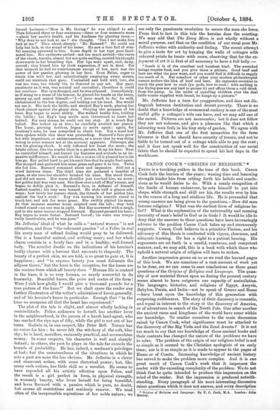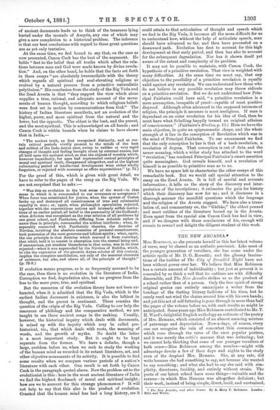CANON COOK'S "ORIGINS OF RELIGION." * THERE is a touching
pathos in the tone of this book. Canon Cook feels the burden of the years ; waning time and lessening strength hinder him from setting forth his beliefs and conclu- sions as be would desire to do. With a manly recognition of the limits of human endeavour, he sets himself to put into shape, while strength and skill are his, the results won by him in the course of a long and stUdious life. He is persuaded that wrong answers are being given to the questions,—How did man become religious? What was the earliest form of religious be- lief? What is the explanation of the universality and seeming necessity of man's belief in God or in Gods? It would be idle to deny that the answers to these questions have been increasingly adverse to the position Canon Cook takes up and strenuously supports. Canon Cook believes in a primitive Theism, and his advocacy of this thesis is conducted with vigour, clearness, and adequate learning. He has a right to a patient hearing. His arguments are set forth in a candid, courteous, and competent manner, and, we may add, this is a book with which those who uphold a natural origin of religion will have to reckon.
Another impression grows on us as we read the learned pages of this book. We are conscious of a vast amount of work yet to be done, ere we can come to sure conclusions on these great questions of the Origins of Religion and Language. The quan- tity of new material thrust upon us during the present century seems almost to have outgrown our capacity of assimilation. The languages, histories, and religions of Egypt, Assyria, Babylon, Persia, and India—not to speak of Greece and Rome —have burst upon the knowledge of this generation with surprising suddenness. The story of their discovery is romantic, and equal in interest to the story of the discovery of America, or of adventures in search of the North Pole. One after another the ancient races and kingdoms of the world have come within our knowledge. To confine ourselves to the main discussion raised by Canon Cook, what significance must be attached to the discovery of the Rig Veda and the Zend Avesta ? It is not too much to say that our knowledge of these ancient books and • their contents has changed the nature of the problems we have to solve. The problem of the origin of our religions belief is not so simple as it seemed to the Christian apologists of an early time; nor is it so simple as it is made to appear in the pages of Hume or of Comte. Increasing knowledge of ancient history has served to make the problem more complex. And it is one great merit of Canon Cook's work that it impresses the reader with the exceeding complexity of the problem. We do not think that he quite intended to produce this impression on the mind of the reader. But the impression is produced notwith- standing. Every paragraph of his most interesting discussion raises questions which it does not answer, and every description * Origins of Religion and Language. By F. C. Cook, M.A.. London: John Murray.
of ancient documents leads us to think of the treasures lying buried under the mounds of Assyria, any one of which may give a new complexion to a historical problem. The inference is that our best conclusions with regard to these great questions are as yet only tentative.
At the same time, we feel bound to say that, on the case as now presented, Canon Cook has the best of the argument. He holds "fast to the belief that all truths which affect the rela- tions between man and God were made known by divine revela- tion." And, on the other hand, he holds that the facts set forth in these essays "are absolutely irreconcilable with the theory which regards all spiritual and soul-elevating religions as evolved by a natural process from a primitive naturalistic polytheism." His conclusion from the study of the Rig Veda and the Zend Avesta is that "they support the view which alone supplies a true, rational, and adequate account of the move- ments of human thought, according to which religious beliefs were first set in motion by communications from God." The history of Indian literature manifests, not an evolution of the higher, purer, and more spiritual from the natural and the lower, but the opposite. The oldest is the best, and the purest, and the most spiritual. This is acknowledged on all hands ; and Canon Cook is within bounds when he claims to have shown that in India,—
" The ancient truth, as first recognised distinctly, and at cer- tain critical periods vividly present to the minds of the best • and noblest of the Indo-Aryan race, owing to sudden or very rapid changes of thought and feeling brought about by external causes, lost all hold upon the national mind, so that the objects of worship which, however imperfectly, for ages had represented central principles of moral and spiritual truth, disappeared altogether, and at the highest culminating period of intellectual development were either wholly forgotten, or rejected with contempt as effete superstitions." (p. 72.)
For the proof of this, which is given with great detail, we have to refer to the pages of the essay on the Rig Veda. We are not surprised that he asks :—
" Was this an evolution in the best sense of the word—in that sense in which it is commended to our reverence or acceptance ? When force was substituted for justice, when the system of Castes broke up and destroyed all consciousness of true and substantial equality in man; or, egain, when philosophic speculation rejected, together with the superstitious notions and intensely selfish institu- tions of an earlier period, all belief in the personality of the Godhead ; when Atheism was recognised as the tree solution of all problems by one great school, and Pantheism differing from Atheism rather in name than in principle, commanded the noblest intellects ; when, in- separably connected with Pantheistic theories, the doctrine of Nirvana, involving the absolute cessation of personal consciousness, took possession of the most generous and loftiest spirits ; when, again, the one principle in that doctrine which rescued it from contempt, that which held it to consist in absorption into the eternal being and, if unconscious, yet absolute blessedness in that union, was in its time rejected—when it was superseded by the Nirvana of Buddha, which, to cite the expression of the greatest Aryan scholar of this century, implies the complete annihilation, not only of the material elements of existence, but also, and above all, of the principle of thought." (p. 72-3.)
If evolution means progress, as is so frequently assumed to be the case, then there is no evolution in the literature of India. Corruption we find, degradation also, but no progress from the less to the more pure, true, and spiritual.
But the resources of the evolution theory have not been ex- hausted, when it is admitted that the Rig Veda, which is the earliest Indian document in existence, is also the loftiest in thought, and the purest in sentiment. There remains the question of the origin of the Rig Veda. Calling to our help the resources of philology and the comparative method, we are taught to see these ancient songs in the making. Usually, however, the historical inquiry which deals with documents, is mixed up with the inquiry which may be called pre- historical, viz., that which deals with roots, the meaning of words, and the growth of myths. No doubt the latter is a most important study. But it ought to be kept separate from the former. We have a definite, though a large, problem before us, when we seek to study the working of the human mind as recorded in its extant literature, art, and other objective monuments of its activity. It is possible to find some results when we compare various periods of a nation's literature with each other. One result is set forth by Canon Cook in the paragraph quoted above. Now the problem set to the evolutionist is this : here in the most ancient literature of India we find the highest floodmark of moral and spiritual insight ; bow are we to account for this strange phenomenon P It will not help to say that this also is the product of evolution. Granted that the human mind has had a long history, ere it could attain to that articulation of thought and speech which we find in the Rig Veda, it becomes all the more difficult for us to understand how, without the help of articulate speech, man should have advanced so far, and then have proceeded on a downward path. Evolution has first to account for this high development at that early period, and then has also to account for the subsequent degradation. Nor has it shown itself yet aware of the extent and complexity of its problem.
It may not be possible to maintain, with Canon Cook, the hypothesis of a primitive revelation. That view is weighted with many difficulties. At the same time we must say, that any objection to the possibility of a primitive revelation is equally valid against any revelation. We can understand how those who do not believe in any possible revelation may throw ridicule on a primitive revelation. But we do not understand how Prin- cipal Fairbairn could have said, "a primitive revelation is a mere assumption, incapable of proof—capable of most positive disproof. Although often advanced in the supposed interests of religion, the principle it assumes is most irreligious. If man is dependant on an outer revelation for his idea of God, then he must have what Schelling happily termed an original atheism of consciousness." (Fairbairn's Studies, p. 13.) Here we have the main objection, in quits an epigrammatic shape, and the whole strength of it lies in the conception of Revelation which was in the mind of Principal Fairbairn. To our amazement we find that the only conception he has is that of a book-revelation, a revelation of dogma. That conception is out of date, and the newer meaning, which a wider study has attached to the word "revelation," has rendered Principal Fairbairn's smart assertion quite meaningless. God reveals himself, and a revelation of himself is as possible to primitive man as to us.
We have no space left to characterise the other essays of this remarkable book. Bat we would call special attention to the essay on the Zend Avesta. It is fall of careful and accurate information ; it tells us the story of the discovery and inter- pretation of the inscriptions; it estimates the gain for history which their discovery has now for us ; and it discusses in a thorough manner the manifold questions which the language and the religion of the Avesta suggest. We have also a trans- lation of, and commentary on, the " Mitts," the oldest penned and most sublime of the literature bound up in the Avesta. Even apart from the special aim Canon Cook has had in view, and if we disagree with these conclusions of his, enough will remain to reward and delight the diligent student of this work.















































 Previous page
Previous page